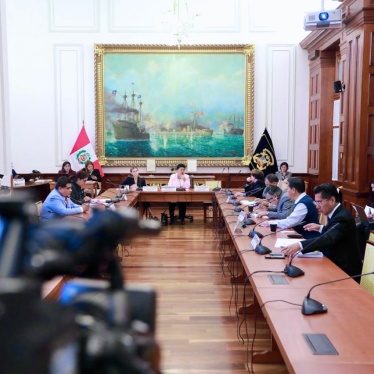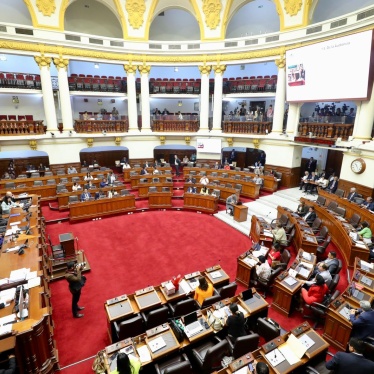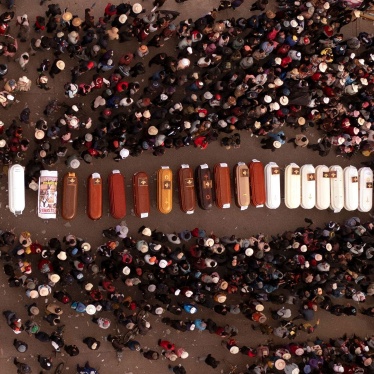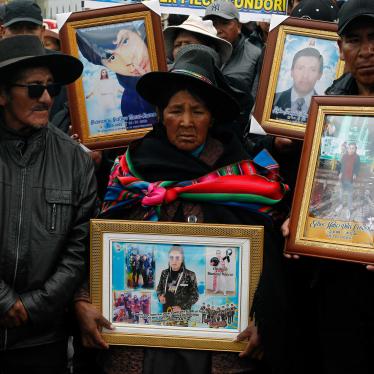Over the last year, Ecuador has repeatedly grabbed headlines due to the growing presence of organized crime in the country. Without more international attention, the next country to do so may be Peru — thanks to Peru’s own government.
A mosaic of private interests has been increasingly bending Peru’s government to their will, breaking the systems that could hold them and their allies accountable, and dismantling protections for human rights and the environment. In the process, they are creating an ideal environment for organized crime to thrive, deepen corruption and further undermine democracy.
Washington has seemed reluctant to say or do much about the assault on the rule of law, perhaps concerned about feeding into political instability or growing Chinese influence. But if Peru continues down its path of institutional destruction, U.S. officials may soon be dealing with even more dangerous and unstable counterparts.
Much of the problem stems from Peru’s Congress. Since they appropriately removed then-President Pedro Castillo after his failed coup in December 2022, politicians from across the political spectrum have joined forces, not to unify the country but to push forward an agenda that’s the stuff of corrupt and criminal actors’ dreams.
Last year, Congress effectively gutted the country’s Efficient Collaboration Law, which had been an essential tool in investigations of organized crime, including the cases against former president Alberto Fujimori’s criminal network. The change may well benefit many representatives themselves, more than half of whom were recently reported to be under criminal investigation.
Congress also shortened the period for tolling the statute of limitations in criminal cases; the president of Congress, Alejandro Soto, immediately invoked the new law to seek dismissal of a criminal case pending against him.
Congress is now considering a bill significantly narrowing the criminal law definition of “organized crime,” making it harder to investigate many related offenses, such as extortion, which has shot up dramatically in recent years.
Other congressional actions directly benefit organized crime and private interests that profit from illegal activities. Illegal gold mining, which according to former Interior Minister and security expert Carlos Basombrío, is now the major illicit economy in the country, was worth an estimated U.S. $4 billion in 2023. Illegal gold mining has been increasingly associated with human trafficking and killings, particularly in remote areas where there is little state presence.
Congress’s repeated extension of a deadline by which informal miners are supposed to register with the government has enabled harmful extraction practices to continue, poisoning rivers and land with impunity. Meanwhile, recent amendments to the country’s Forestry Law, which regularized past large-scale illegal deforestation, will most likely shutter many environmental crime investigations.
Far from fighting these measures, President Dina Boluarte — also now under criminal investigation in connection with her receipt of three Rolex watches and a $50,000 bracelet from the governor of the impoverished Peruvian state of Ayacucho — has repeatedly joined forces with Congress, which recently voted down several motions to remove her from office.
Meanwhile, Congress has been steadily capturing institutions that would impose checks upon them, including through questionable appointment processes for the Constitutional Tribunal and the Ombudsperson’s office. Both bodies now routinely side with congressional interests in ways that undermine the rule of law and human rights; legal experts, including the Lima Bar Association, have criticized some of the tribunal’s rulings as flagrantly unconstitutional.
In March, Congress removed on specious grounds two members of the National Justice Board, which appoints judges, prosecutors and the heads of key electoral agencies. On June 5, a congressional committee approved a constitutional amendment that would eliminate the board entirely and give legislators the power to name electoral authorities instead.
Many Peruvians have watched their authorities with disgust; approval ratings for Congress and President Boluarte are in the single digits. But the public has largely remained silent since the authorities brutally cracked down on protests in 2023, leaving 49 protesters and passersby dead. Peruvians — many seeing no future in the country — are leaving in record numbers.
Peru has strong commercial ties to China, but the United States still has tremendous influence and should be more vocal about the slow-brewing crisis. Many Peruvians credit a statement by U.S. Sens. Ben Cardin (D-Md.) and Tim Kaine (D-Va.) with deterring Peru’s Congress from removing the entire National Justice Board in March.
Peruvian officials still like to travel to the U.S. Removing visas of individuals credibly linked to abuse and corruption would send a strong message that the Biden administration cares about the rule of law in Peru.
The U.S. should also work with democratic governments in the Organization of American States to raise concern about the weakening of Peru’s democracy. The OAS Inter-American Democratic Charter allows any member state — or the group’s secretary general — to convene the region’s ambassadors when a member nation suffers an “unconstitutional alteration of the constitutional regime that seriously impairs the democratic order.”
Across Latin America, from Venezuela to Guatemala, Mexico, and beyond, we have seen organized crime and corrupt actors infiltrate and control state institutions, with devastating consequences for democracy and human rights. It is not too late to stop them in Peru.









